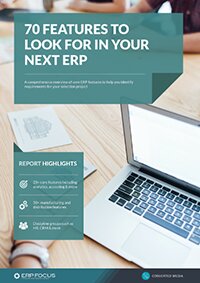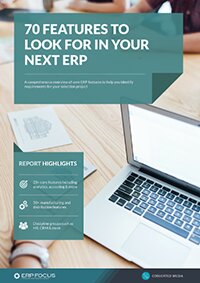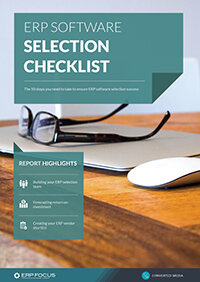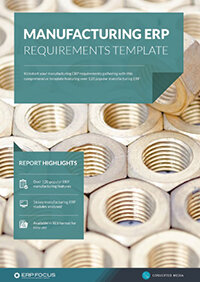4 essential ERP features to include in your requirements
No matter how technically minded or business aware you are, it’s easy to get overwhelmed by the vast array of ERP features. It’s just as easy to buy into enticing modules that you just don’t need. You could buy the most expensive and exciting ERP on the market but that won’t guarantee success. After all, it doesn’t matter how deep your submarine can dive if you’re planning a trip to the moon.
Before you even begin to compare ERP features and functions, you need to do your homework to identify what will (and won’t) deliver an ROI. Requirements gathering is key, during which you should ask yourself:
- What are your business goals?
- What problems does your new ERP need to solve?
- Which of your existing systems should it replace or integrate with?
Finding the best system for your business means knowing what features to look out for and which will solve your unique set of challenges. Since no two businesses are the same, we’ll focus on the features that apply to the many. Here are some essential ERP features and benefits for enterprises of all sizes and in all verticals.
Use our free ERP selection survival guide to find the right ERP system to fit your requirements
1) Customer Relationship Management
Any business seriously considering an ERP will already have a CRM system in place. Whether that existing CRM is doing what you need it to or not is another question. When building your ERP requirements checklist, take a good look at how you’re currently handling leads, opportunities, customer service, and client communication. Ask yourself, the business, and even your customers whether you’re:
- Supporting your customers as well as they expect
- Enabling your sales and marketing teams with intuitive, automated tools
- Delighting your existing customers with effective, welcome and timely communication
- Acting on opportunities to upsell and cross-sell
- Converting new prospects efficiently
Did your research turn up any areas of weakness? This is your chance to resolve them. Look for ERP modules that can make an impact on your customer service and sales efforts as a priority.
2) Finance and accounting
One of the top ERP functional requirements for all businesses is improved financial processes. By having one module to handle tax requirements, payments, receivables, and banking, finance teams can enjoy:
- Increased information gathering
- Faster report generation
- Improved reporting quality
- Greater automation
- Reduction in human error
A robust finance ERP module reduces labor costs and enables better decision making. Real-time financial data improves forecasting and agility so that your business stays one step ahead.
3) Ease of integration
During your requirements gathering, you’ll have identified which existing software systems you want to keep. In your ERP requirements checklist, make sure you list the tools you want your new ERP to integrate with.
By integrating your systems, users will get the same functionality without having to dip in and out of different portals. You’ll also have the benefit of all data and communications being driven by one unified system. Afterall, that’s the crux of a successful ERP solution.
4) Scalability
ERP systems are designed to scale but it’s the cost of that scalability that you need to consider. Are you anticipating rapid growth in the next five years? Look at how well each solution can cope with your projected user increase. Then look at how that is going to affect the cost. Will you need to pay additional license fees if your users increase by X amount? Will you need additional hardware, or should you look at cloud hosted solutions?
Every business is different but everyone wants growth. Make sure you plan well ahead so that your ERP can handle that growth without it becoming cost-prohibitive.
Free white paper

70 features to look for in your next ERP
A comprehensive guide to help you identify requirements for your ERP selection

Featured white papers
-

60-Step ERP Selection Checklist
Get the comprehensive checklist for your ERP selection project
Download -

Manufacturing ERP requirements template
Over 120 critical manufacturing ERP features in one downloadable spreadsheet
Download -

ERP Requirements template
Plan your ERP selection using our requirements template with 100 features in an editable spreadsheet. Include special requirements and extra detail in this exclusive template.
Download
Related articles
-

Top 10 ERP selection criteria (including checklist)
The most important ERP selection criteria you should keep in mind during your selection process.
-

Secret KPI: Why Your ERP Implementation Team Matters More Than Software
Learn how Godlan ensures successful ERP implementation for manufacturers with proven strategies &...
-

How to use ERP project management tools to improve efficiency
Advice on using your ERP project management tools to their full potential

